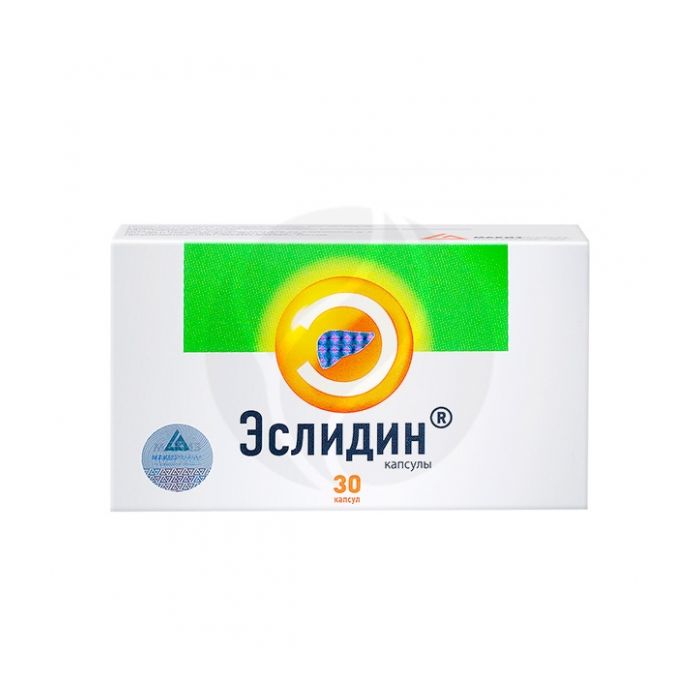Eslidin capsules, No. 30
Expiration Date: 05/2027
Russian Pharmacy name:
Эслидин капсулы, №30
The drug is used in gastroenterology, dermatology, neurology, cardiology.
fatty degeneration of the liver of various etiologies;
acute and chronic hepatitis (except viral);
cirrhosis of the liver;
toxic liver damage (alcoholic, narcotic, medicinal);
dysfunction of hepatocytes (as a complication in other diseases);
pre- and postoperative treatment for operations in the hepatobiliary zone;
psoriasis (as part of complex therapy);
atherosclerosis of cerebral vessels (as part of complex therapy);
atherosclerosis of the coronary arteries (as part of complex therapy);
diabetes mellitus (as part of complex therapy);
exhaustion, dystrophy.
The drug is taken orally during meals. The capsules should be swallowed whole with plenty of water.
For liver diseases, atherosclerosis of the coronary arteries and cerebral vessels, diabetes mellitus, dystrophy and exhaustion , 2 capsules are prescribed 3 times / day. The recommended course of treatment is 3 months, the minimum course is 1 month.
With psoriasis - 2 capsules 3 times / day. The recommended course of treatment is 2 weeks.
Children over 7 years of age with liver diseases, diabetes mellitus, fatty degeneration of the liver - 2 capsules 3 times / day for 1-3 months.
For psoriasis, children over 7 years old - 2 capsules 3 times / day for 2 weeks.
Children from 3 to 7 years old are prescribed 1 capsule 3 times / day for 1-3 months.
Hard gelatin capsules, No. 0, brown body and lid; the contents of the capsules are a yellow-brown or brown homogeneous mass from an oily to a denser consistency with a characteristic odor.
polyunsaturated phospholipids from soy lecithin (PPL fraction) (PPL-400 lipoid) 300 mg
methionine 100 mg
Excipients : soybean oil - up to 550 mg.
severe hepatic impairment, hepatic encephalopathy;
viral hepatitis;
children under 3 years old;
hypersensitivity to the components of the drug.
The drug should be used with caution during pregnancy, in children aged 3 to 7 years, with renal failure (due to the risk of increasing hyperazotemia).
pharmachologic effect
The combined preparation has a hepatoprotective effect, normalizes all types of metabolism (fat, protein, carbohydrate).
Methionine, one of the active components of the drug, is an essential amino acid that is a source of mobile methyl groups. Methionine is essential for the synthesis of choline. An increase in choline content increases the synthesis of endogenous (internal) phospholipids and decreases the deposition of neutral fat in the liver. Methionine is also required to detoxify xenobiotics. In atherosclerosis, it reduces the concentration of cholesterol and increases the concentration of blood phospholipids.
Essential phospholipids are essential factors for the development and functioning of liver cells. The main fraction of essential phospholipids in the preparation is represented by phosphatidylcholine (73%), which is the main component of biological membranes. Once in the body, phosphatidylcholine restores the integrity of the membranes of the affected liver cells and activates the phospholipid-dependent enzymes located in the membrane, thereby normalizing permeability and enhancing the detoxification and excretory potential of liver cells.
Methionine and essential phospholipids enhance each other's action, being a source of endogenous and exogenous phospholipids, respectively, improve the functional state of liver cells and have a hepatoprotective effect.
Methionine is also involved in the exchange of sulfur-containing amino acids, in the synthesis of epinephrine, creatinine and other biologically active compounds, transforms the action of hormones, vitamins (B12, ascorbic, folic acids), enzymes, proteins, and participates in reactions of peremethylation, deamination, decarboxylation.
EslidinЃ restores liver function, increases its detoxification capacity, and also normalizes fat, carbohydrate and protein metabolism in the body.
Pharmacokinetics
Data on the pharmacokinetics of EslidinЃ are not provided.
Indications for EslidinЃ
The drug is used in gastroenterology, dermatology, neurology, cardiology.
fatty degeneration of the liver of various etiologies;
acute and chronic hepatitis (except viral);
cirrhosis of the liver;
toxic liver damage (alcoholic, narcotic, medicinal);
dysfunction of hepatocytes (as a complication in other diseases);
pre- and postoperative treatment for operations in the hepatobiliary zone;
psoriasis (as part of complex therapy);
atherosclerosis of cerebral vessels (as part of complex therapy);
atherosclerosis of the coronary arteries (as part of complex therapy);
diabetes mellitus (as part of complex therapy);
exhaustion, dystrophy.
Side effect
Allergic reactions are possible .
Contraindications for use
severe hepatic impairment, hepatic encephalopathy;
viral hepatitis;
children under 3 years old;
hypersensitivity to the components of the drug.
The drug should be used with caution during pregnancy, in children aged 3 to 7 years, with renal failure (due to the risk of increasing hyperazotemia).
Application during pregnancy and lactation
There have been no studies confirming the safety of Eslidine for the fetus and the safety for the baby during breastfeeding.
The use of the drug during pregnancy and lactation is possible only as directed by a doctor in cases where the intended benefit to the mother outweighs the possible risk to the fetus and child.
Application for violations of liver function
Contraindicated in severe hepatic failure, hepatic encephalopathy, viral hepatitis.
Application for impaired renal function
The drug should be used with caution in case of renal failure (due to the risk of an increase in hyperazotemia).
Application in children
Contraindication: children under 3 years of age. The drug should be used with caution in children aged 3 to 7 years.
Overdose
If the daily dose is accidentally exceeded by several times, a decrease in blood pressure, an increase in heart rate, and disorientation are possible.
Treatment: symptomatic therapy is performed.
Drug interactions
The drug interaction of the drug EslidinЃ is not described.

